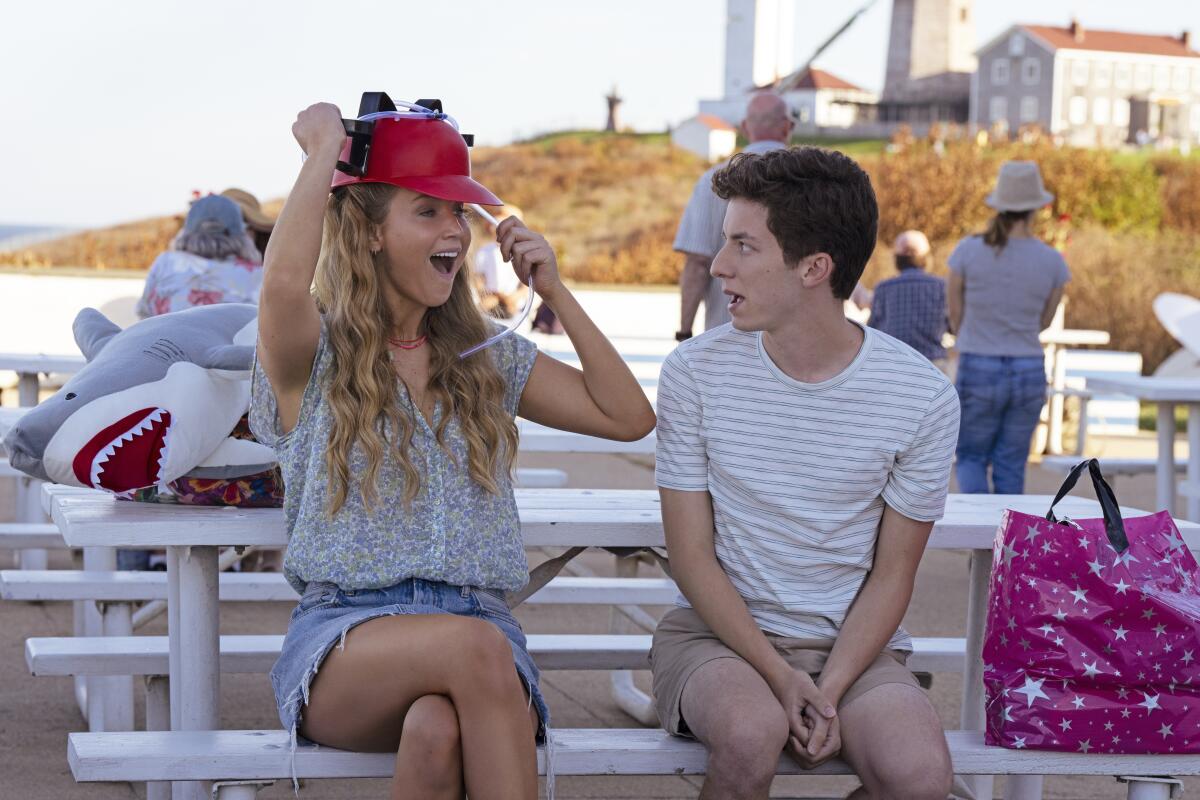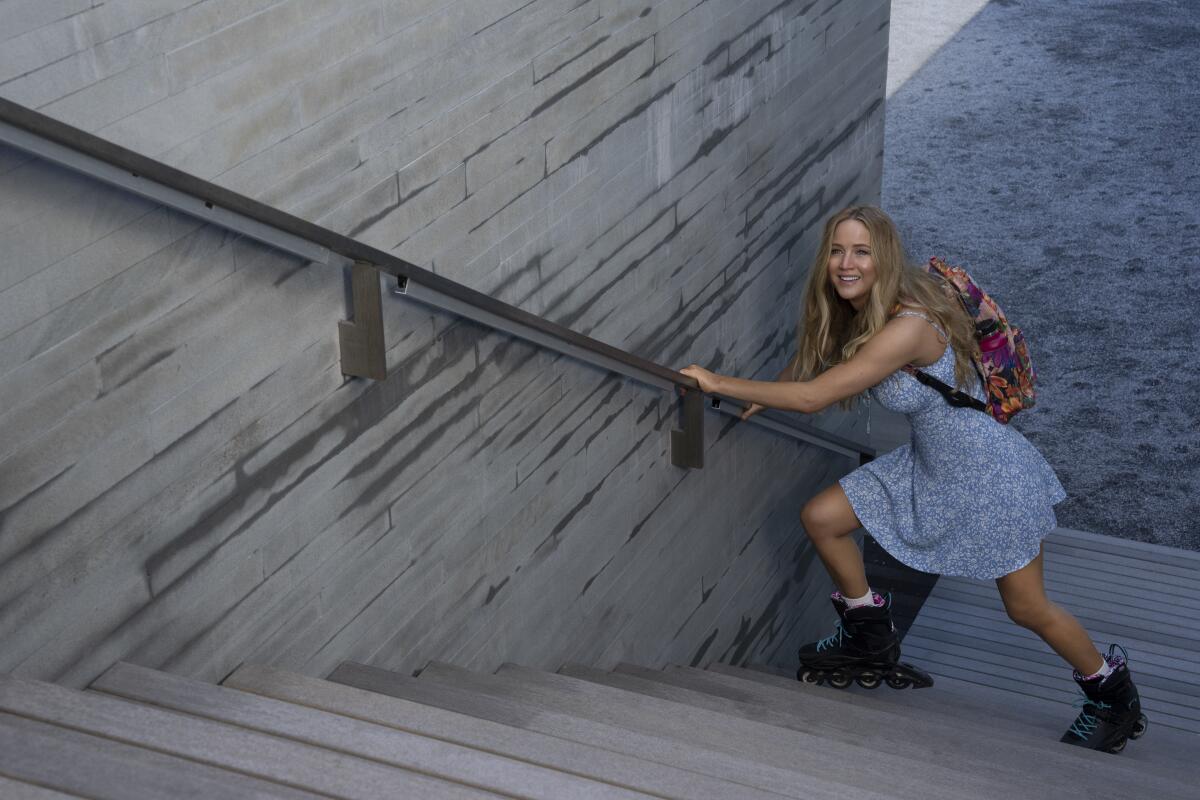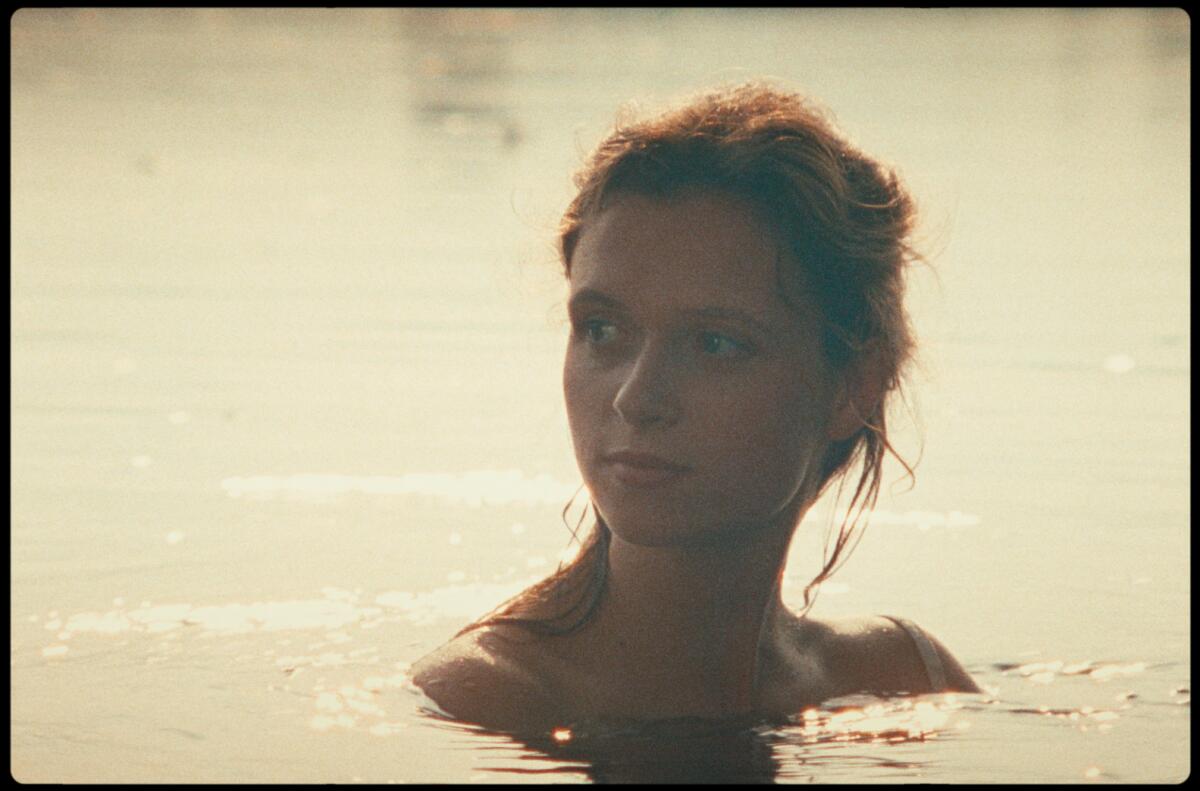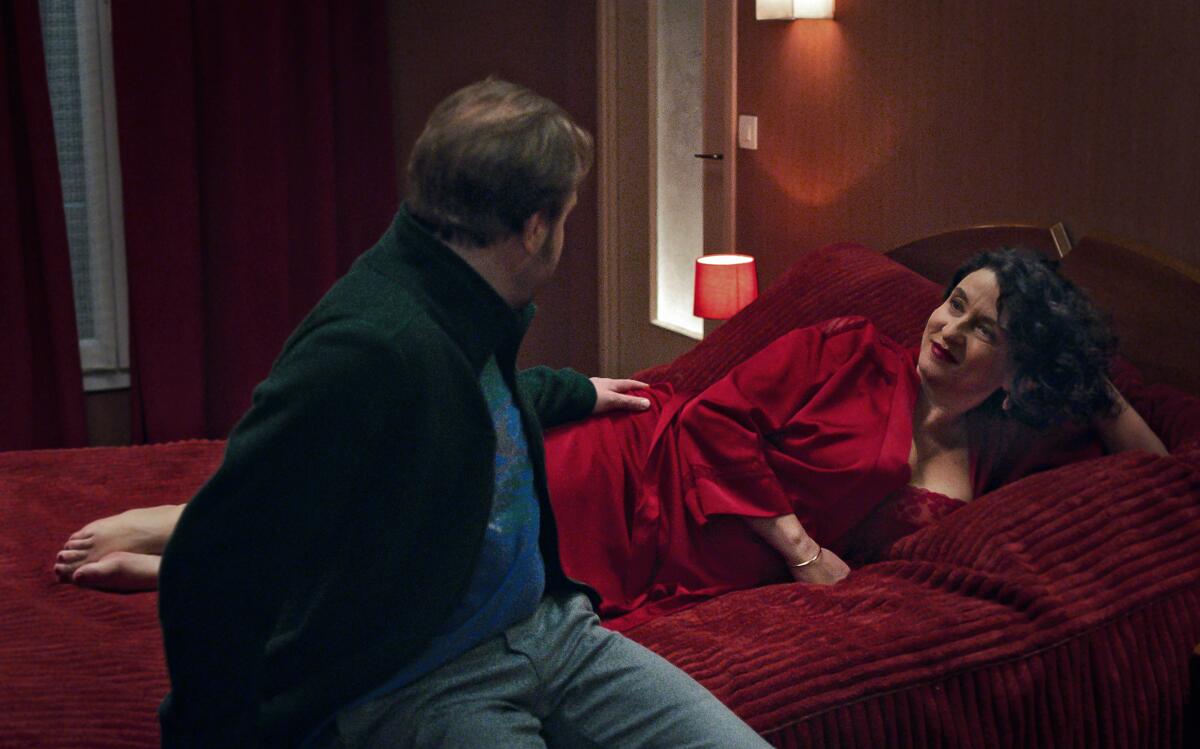Jennifer Lawrence’s comeback takes a bawdy turn in ‘No Hard Feelings’

- Share via
Hello! I’m Mark Olsen. Welcome to another edition of your regular field guide to a world of Only Good Movies.
The biggest movie news this week may have involved a television channel, as Warner Bros. Discovery announced personnel cuts at the beloved Turner Classic Movies channel, including programming head Charles Tabesh, general manager Pola Changnon and Genevieve McGillicuddy, who was instrumental in the TCM Classic Film Festival. This news understandably set the online film world ablaze.
A Zoom call was arranged between WBD CEO David Zaslav and filmmakers Martin Scorsese, Steven Spielberg and Paul Thomas Anderson, three of the leading advocates for film preservation and cinema culture in Hollywood. In a joint statement released after the meeting, the three directors said of Zaslav, “It’s clear that TCM and classic cinema are very important to him.”
As reported by The Times’ Stephen Battaglio, it is possible that, due to the public outcry, Tabesh may not be laid off after all. As Battaglio wrote, “One factor in TCM’s favor is that Zaslav likely does not want to anger Hollywood elites more than he already has.”
‘Hollywood’s Finest” screening. Times photographer Christina House recently won a Pulitzer Prize for her work documenting the lives of young women on the street. A feature-length documentary companion piece, directed by Claire Hannah Collins, will screen Friday night as part of the Dances With Films festival at the TCL Chinese Theatres.
Women in Film and “Norma Rae.” The organization Women in Film, Los Angeles is celebrating its 50th anniversary this year. To mark the occasion, it’s launching a screening series to commemorate the work of women in front of and behind the camera. The series launches June 29 with a timely screening of workplace union drama “Norma Rae” at Vidiots. Star Sally Field, along with producers Tamara Asseyev and Alexandra Rose, will be in attendance for a Q&A moderated by actor-filmmaker Lake Bell.
Enjoying this newsletter? Consider subscribing to the Los Angeles Times
Your support helps us deliver the news that matters most. Become a subscriber.
‘No Hard Feelings’
Jennifer Lawrence took a break from stardom and returned last year as actor and producer with a delicate dramatic turn in “Causeway.” Now she turns up (again producing) in the very different “No Hard Feelings,” a hard-R comedy directed and co-written by Gene Stupnitsky. Lawrence plays Maddie, a Montauk local who is desperate for a new car and answers an unusual offer from the parents of a shy young man named Percy (Andrew Barth Feldman) to date him for the summer before he goes off to college. The movie is in theaters now
For Tribune News Service, Katie Walsh wrote, “’No Hard Feelings’ is a direct descendant of ’80s teen coming-of-age comedies but evolved for a new generation. It’s a ‘Superbad’-style story with the sensitivity and class consciousness of John Hughes, a delightfully raunchy streak, and Lawrence going for broke in a bold and bawdy performance as a rowdy Long Island surfer girl doing her best Mae West. There simply aren’t enough female dirtbags in cinema, so Lawrence’s Maddie Barker — Uber driver, surly bartender and pissed-off Montauk townie — is a refreshing character.”
For Vanity Fair, Richard Lawson wrote, “Gene Stupnitsky’s film has a kinder, gentler tone and intent than its logline suggests. ‘No Hard Feelings’ is a nice comedy, courting taboo here and there but largely rounded out with sweetness. It’s an amiable time at the movies — but I was hoping for more of a shock. … Despite those occasional bursts of raucous energy, though, the film’s presiding vibes are laidback. Which is a slight disappointment, demanding a sudden realignment of expectations to get on the movie’s wavelength. On its own terms, though, ‘No Hard Feelings’ is an agreeable, if fleeting, pleasure.”
For the Hollywood Reporter, Lovia Gyarkye wrote, “The film, directed and co-written by Stupnitsky (‘Good Boys’), is modeled after the raunchy comedies of the early aughts — the kind of mid-budget studio flicks that end up buried in the algorithmic madness of a streaming service these days. This airy and refreshingly low-stakes comedy will have you steadily chuckling, if not necessarily rolling on the floor laughing. But it also has a surprising amount of heart. … It’s fun to watch [Lawrence] embrace her sillier register, but her dramatic skills are a boon, too, lending depth to a character that could be one-note and making it easier to believe the more emotional turns the film takes later.”
For The Playlist, Marya E. Gates wrote, “Lawrence is clearly having fun with the broad comedy aspects of the film, but much of what Maddie is subjected to crosses the line from raunchy to straight degradation, pushing the limit of just how broad is too broad. … The flaccid script, co-written by Stupnitsky and John Phillips (‘Dirty Grandpa’), addresses timely subjects like income inequality, helicopter parents, Gen-Z’s addiction to screens, and the compulsion to record everything, but never actually seems to have a point of view on any of these subjects. Instead, this shallow film uses these topical issues to propel its characters from one preposterous comedy set piece to the next. To see an actress of Lawrence’s caliber utter a hollow line like ‘I was hurt, so I hurt people’ is perhaps the cringiest aspect of the entire film.”

‘Scarlet’
An adaptation of a Russian novel relocated to France, “Scarlet” is directed and co-written by Italian filmmaker Pietro Marcello, who previously made the well-received “Martin Eden.” A young woman, Juliette (played as an adult by Juliette Jouan), is raised by her widowed father, Raphaël (Raphaël Thiery), and she comes to long for something beyond the confines of their small village. Louis Garrel and Noémie Lvovsky also are part of the cast. The movie is in theaters now.
For The Times, Robert Abele wrote, “Even as the narrative stays true to its atmosphere of a portrait of endurance in the face of adversity, the adopted buoyancy feels earned and holds. … One can sense an alignment with the aura of mystery, toil and eternal beauty conjured by his talented countryfolk Alice Rohrwacher (‘Happy as Lazzaro’) and the duo of Alessio Rigo de Righi and Matteo Zoppis (‘The Tale of King Crab’), even if Marcello has chosen here a Russian story and French setting to explore rather than an Italian one. The world of ‘Scarlet’ is one of magical realism first and foremost, anyway, in which specificities fall away to give room for more enigmatic, unhurried charms.”
For the New York Times, Manohla Dargis wrote, “One of the attractions of ‘Scarlet’ is that it doesn’t fit obvious categorization, which means that you’re not always sure where it’s headed or why. The vibe is by turns sober, warm, melancholic and playful to the point of near-silliness. You may laugh and cry, as the movies always promise us, though you may also quizzically scratch your head. … As Marcello shifts tones and moods, he engages with (although at times merely gestures at) different subjects — manual labor, magic, modernity — some of which stick better than others do.”
For rogerebert.com, Matt Zoller Seitz wrote, “‘Scarlet’ moves according to its own distinctive rhythm. It’s slower and more contemplative than modern audiences are conditioned to accept, and it frequently surrenders to its muse, like its characters. You’ll settle into a comfortable groove with the film when it’s showing people doing complicated tasks with their bare hands in loving closeup, and then bang, here comes a full-length musical number ... or a scene of potential violence or violation. … It’s all over the place, and if there was a way to unify all of its disparate elements, the filmmaker never quite figured it out. You just have to agree that it’s all of a piece and accept it isn’t going to settle into any one mode for very long.”

‘Nobody’s Hero’
Directed and co-written by Alain Guiraudie, “Nobody’s Hero” tells a farcical story centered around Médéric (Jean-Charles Clichet), who finds himself falling for a sex worker (Noémie Lvovsky) at the same time he encounters Selim (Ilies Kadri), a young Muslim man who may be behind a recent terrorist attack. The movie is in theaters now.
For The Times, Michael Rechtshaffen wrote, “Guiraudie, who penned the script along with Laurent Lunetta, obviously has much on his plate as his dueling scenarios ping-pong urgently between the forces of desire and paranoia before coming to an intersection of sorts, with the various players involved all congregating, Oscar Wilde-style, in the middle of Médéric’s apartment. … The double narratives at play here, each of which could have made for a respectable standalone film, are unable to find a unifying pitch.”
For the New York Times, Beatrice Loayza wrote, “[Guiraudie] is a gifted conjurer of paranoia with an erotic edge. Things aren’t typically ‘solved’ at the end of his woozy mysteries, which are often set in rural dream worlds where the boundaries of gay and straight don’t seem to matter. … As a straight dark comedy about French Islamophobia, ‘Nobody’s Hero’ doesn’t make a lot of sense. Guiraudie is after something much different here: creating a palpable sense of the connection between fear and desire, which, sure, aren’t the most rational of our human impulses — but neither are love, marriage or jihadist crusading.”
For Variety, Guy Lodge wrote, “That ‘Nobody’s Hero’ pulls a number of punches is especially disappointing coming from Guiraudie, whose 2013 breakout feature ‘Stranger by the Lake’ sealed his status as one of contemporary French cinema’s nerviest, most playful provocateurs. … At a push, you could say the film’s unsettled, uneven rhythm is reflective of a modern France pulled in multiple political directions, evening out into a bristling, unhappy kind of stasis — in years to come, at least, Guiraudie’s film may seem a strange, revealing curio of its era. Right now, however, it doesn’t feel quite equal to the moment.”

Only good movies
Get the Indie Focus newsletter, Mark Olsen's weekly guide to the world of cinema.
You may occasionally receive promotional content from the Los Angeles Times.




